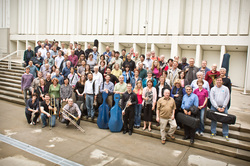
The Atlanta Symphony Orchestra Players Association (ASOPA) announced that the musicians voted to accept a new Collective Bargaining Agreement (CBA) for the term of September 23, 2012 – September 6, 2014.
In an unprecedented and extremely painful move designed to keep the music going, ASOPA agreed to every dollar in concessions that the Woodruff Arts Center (WAC) and ASO management have demanded since the lockout began on August 25. In the interest of continuing to bring music to the community and opening the season on time, ASOPA has accepted $5.2 million in concessions over a brief two-year agreement.
The concessions were made against the backdrop of ASO board chair Jim Abrahamson’s claim that the ASO is “on the brink of extinction.” Despite its executives’ dire assessment, the only ASO gesture toward sharing the financial pain is an agreement that CEO Stanley Romanstein, his second in command Donald F. Fox (whose salaries alone were $314,000 and $291,000, respectively, according to the most recent IRS documents filed by the ASO) and three other ASO managers will merely have their aggregate pay cut by 6%. No staff running ASO subsidiaries, including Verizon Wireless Amphitheatre, will be affected. The musicians had proposed that all staff earning the equivalent of their base salary and above share equally in the musicians’ sacrifices, which would have yielded exponentially greater savings.
Those charged with overseeing the ASO have done historic damage to the future of the Orchestra by insisting on an arbitrary “musicians’ share” of $5.2 million. They have set the ASO back over 31 years in work weeks for the musicians and over 10 years in musicians’ compensation, not even taking inflation into account. This will make it all the more challenging to retain and continue to attract the talent that has brought international acclaim and national prominence to Atlanta’s Grammy award-winning ensemble.
The musicians’ costs were a mere 28% of the total ASO budget in recent years, a figure which will now drop to 24%. Yet the musicians will now produce the vast majority of the savings demanded by the ASO and the WAC, absorbing 17% and 14% individual pay cuts in the two years of the agreement. The number of musicians will drop from 95 to 88, a figure that is almost eclipsed by the current ASO administrative staff of 74. The season will be reduced from 52 to 41 weeks in 2012-13 and 42 weeks in 2013-14. The musicians also agreed to shoulder part of their health insurance premiums, and to increased flexibility in working conditions, allowing ASO management to utilize the orchestra in smaller ensembles simultaneously.
When the ASO was last the size and season length it is being reduced to now, the administrative staff was smaller than 15. The musicians are not, and have never been, the cause of financial problems at the ASO, and in light of these agonizing cuts cannot be cited as such in the future. Their world-class performance is in stark contrast to that of the ASO’s leadership, both current and past. Management must be held accountable for under-performance at nearly every level for the past decade. For example, the operations of the ASO’s expensive summer venues, Chastain Park and Verizon Wireless Amphitheatre (where the musicians will hardly play in the future) have repeatedly failed to meet revenue projections. These failures account for a huge proportion of the ASO’s recent deficits. The ASO and WAC boards and the public must demand serious results from management -- results that will begin rebuilding the ASO to major-league status.
The musicians of the Atlanta Symphony Orchestra have agreed to these deep concessions for one reason alone, and that is to do what they do best: continue to play great music for their public at an extraordinarily high level. They hope you will join them in support and recognition of this sacrifice by attending upcoming concerts, donating generously, and recognizing that the people on stage are the assets that must be preserved.
www.ATLsymphonymusicians.com
Facebook: ATLSymphonyMusicians
Twitter: @ATLSymMusicians
 RSS Feed
RSS Feed